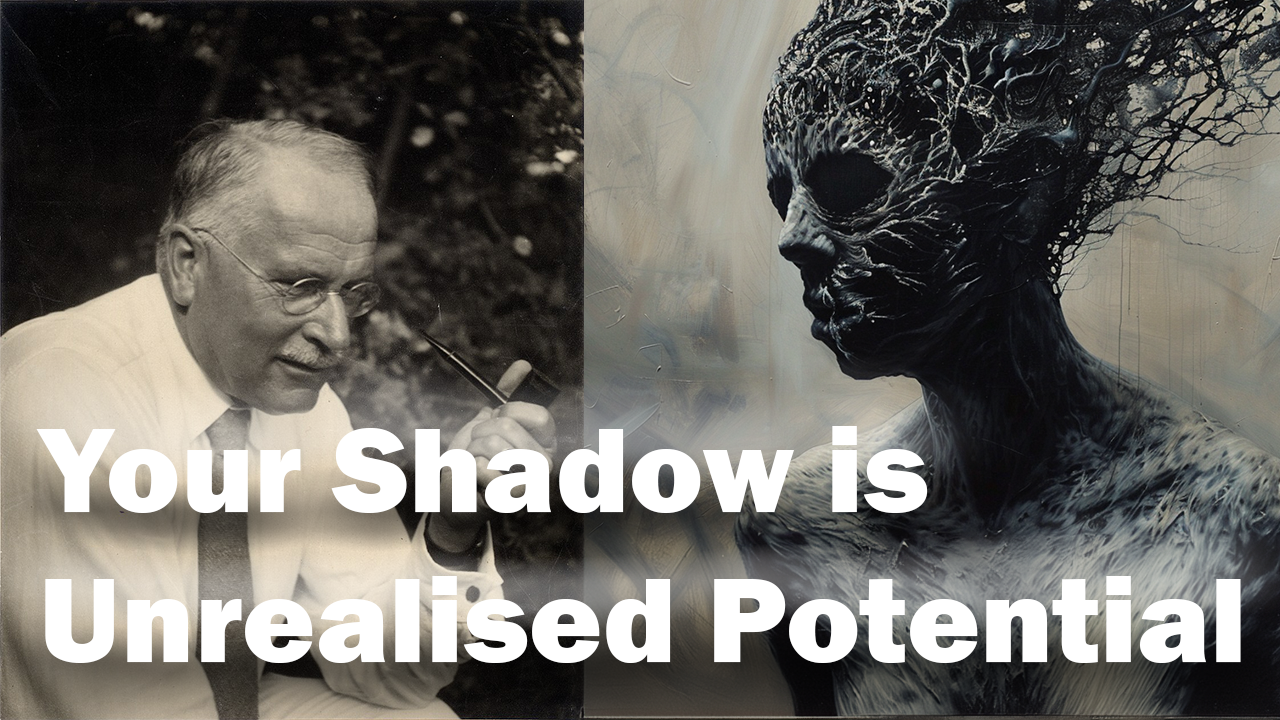
“I have learned from my own experience that the most powerful factor, as well as the one that is more difficult to handle, is the shadow. Everything negative in human nature is personified by the shadow, and so it is no wonder that it casts such a heavy burden upon the whole of our lives.”
Carl Jung, “Memories, Dreams, Reflections”
Thanks to the internet, mass media and pop-psychology most of us have a basic knowledge of what constitutes a personality, it’s our social self, the mask that the psyche wears when whenever we want to be liked, accepted, or even cherished by the people that we happen to find around us, whether that’s in the workplace, at home, mixing with friends for a drink and so on; but did you know that the Persona has an equal and opposite Shadow made up of all of the things that we’d prefer to keep hidden or repressed. We may fear for instance, that should our darker impulses become known then the people that we like, love and spend time with may no longer like us, or even choose to be with us, their opinion of us would certainly change and not for the better. We might find ourselves cast out of polite society and left to fend for ourselves as socially excluded deviants, pushed to the fringes of human civilisation; for social animals such as human beings this can often be a fate worse than death.
“Man is by nature a social animal; an individual who is unsocial naturally and not accidentally is either beneath our notice or more than human. Society is something that precedes the individual. Anyone who either cannot lead the common life or is so self-sufficient as not to need to, and therefore does not partake of society, is either a beast or a god.” – Aristotle – Politics
The Swiss psychiatrist and father of analytical psychology Carl Gustav Jung however, recognised that the human mind, or ‘psyche,’ is a fractured and disunited thing that needs to be made whole should one ever hope to live authentically and individualise, which for a Jungian simply means to become your truth self over time, to learn how to listen to your subconscious mind, to uncover the real you that exists outside of social expectations.
Jung believed that true psychological growth and maturity can only be achieved through a reconciliation of the different aspects of oneself, including both the light and the dark. Within his works like “The Archetypes and the Collective Unconscious,” “Modern Man in Search of a Soul,” and “Memories, Dreams, Reflections” he expresses the idea that one should not only confront the shadow but integrate it into one’s own conscious awareness, shadow integration is for Jung an essential part of psychological growth and self-realisation. You cannot become whole until you both recognise your shadow and integrate it into your total psyche that Jung referred to as the ‘Self’.
So, what is the ‘Shadow?’
The concept of the shadow as a hidden, unconscious aspect of the personality containing traits and impulses that are repressed or denied, is a central concept in Jungian psychology. Integrating the shadow involves acknowledging and coming to terms with these darker aspects, and this process leads to psychological wholeness and self-actualisation. For most of us the shadow is repressed but finds expression in the act of shadow projection.
What is shadow projection?
In analytical psychology, particularly as described by Carl Jung, shadow projection refers to a defence mechanism in which individuals attribute their own ‘unacceptable,’ thoughts, emotions, or impulses to someone or something outside of themselves, often onto others.
The local vicar or church leader, a man of whose persona is one of great piety might unconsciously project its shadow onto others by mentally labelling them as sinners, the godless, or heathens, those that doubt the existence of God or are sexually immoral etc.
A young man who drives to work in a rust bucket of a car, an old junkyard clunker, what we’d call an old banger in the UK, might see someone driving past in a brand-new car and mutter under his breath that the guy’s an arsehole, underserving of such a nice thing, and in doing so, be projecting their insecurity over their socio-economic status onto someone driving a newer car.
The weak and timid man may have a shadow that’s possessed of violent, power fantasies in which he beats to a pulp the last man who insulted him. These projections serve to deflect their own inner fears or insecurities onto others.
This projection can result in negative judgments, accusations, and behaviour towards others, while the projector remains unconscious of their own unacknowledged aspects of their psyche. The person engaging in shadow projection is effectively blaming external factors for their own inner turmoil, their fears, or unacceptable feelings, rather than recognising and owning up to them.
The shadow isn’t just bad things from a societal point of view, for example the career criminal has within him the shadow of a good man, an honest man who is a credit to his community. According to Jung, the shadow isn’t solely negative. Just as there is a positive side to a criminal’s shadow, there is also a positive aspect to a saint’s shadow. The saint may have an unacknowledged aspect of mischief, doubt, or worldly desire that is repressed in their persona. The shadow isn’t solely about ‘bad’ or ‘good’, but represents the complete, often unconscious, aspects of an individual. So, the shadow isn’t evil, it’s just repressed!
So how do we integrate the shadow?
An easy method to begin with and one that I tend to use, is a type of psychological mindfulness. I simply watch my thoughts without fear or judgement, whenever I catch myself in an act of shadow projection, I simply say to myself, something along the lines of ‘that’s me, a part of me that is both perfect and necessary, it might not be very useful now, but it may be needed in the future.’
Consciously observing thoughts without fear or judgement, can be a very valuable tool in identifying moments of shadow projection. By acknowledging and accepting those aspects as a part of yourself, both perfect and necessary, you are taking the first step towards integrating the shadow. Recognising that each aspect serves a purpose, even if it’s not immediately apparent or useful, is a key understanding in the process of becoming whole. So, pay attention to your thoughts, emotions, and behaviours, especially those that you might not like or would rather keep hidden. Reflect on where these aspects of yourself might be manifesting in your life and acknowledge them without judging or denying them. This is a prerequisite step in the process of individuation, the light only has meaning when contrasted with the dark. One without the other is meaningless, having no value whatsoever.
This process of integration often involves confronting and acknowledging the less desirable aspects of oneself, which can often lead to further psychological and spiritual growth.
Another practical approach is to engage in activities that allow you to explore and express your feelings and thoughts, such as writing in a journal, drawing or painting, or simply talking to a trusted friend or therapist about these aspects of yourself. Creative expression in any and all forms is a great way of uncovering and integrating your shadow into your whole psyche, or ‘Self.’ Alas, I am not a very talented man, so painting, drawing, sculpture, music and whatnot are not for me, but I can write so I tend to write out my psyche, drawing diagrams, scribbles on paper, including meaningful thoughts typed in random word documents. You never know, they might become articles in their own right at some point in the future.
“No tree, it is said, can grow to heaven unless its roots reach down to hell.” – C.G Jung – Aion: Researches into the Phenomenology of the Self

